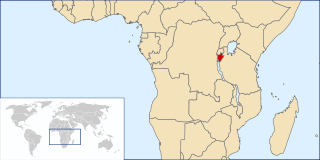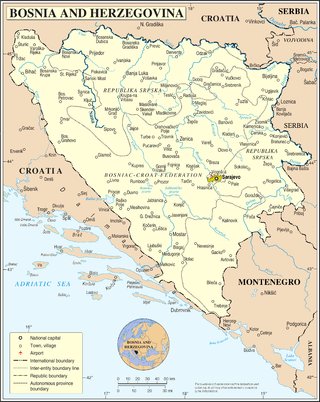
The United Nations Interim Administration Mission in Kosovo is the officially mandated mission of the United Nations in Kosovo. The UNMIK describes its mandate as being to "help the United Nations Security Council achieve an overall objective, namely, to ensure conditions for a peaceful and normal life for all inhabitants of Kosovo and advance regional stability in the Western Balkans."

United Nations Security Council resolution 1244, adopted on 10 June 1999, after recalling resolutions 1160 (1998), 1199 (1998), 1203 (1998) and 1239 (1999), authorised an international civil and military presence in the Federal Republic of Yugoslavia and established the United Nations Interim Administration Mission in Kosovo (UNMIK). It followed an agreement by Yugoslav President Slobodan Milošević to terms proposed by President of Finland Martti Ahtisaari and former Prime Minister of Russia Viktor Chernomyrdin on 8 June, involving withdrawal of all Yugoslav state forces from Kosovo.
The political status of Kosovo, also known as the Kosovo question, is the subject of a long-running political and territorial dispute between the Serbian government and the Government of Kosovo, stemming from the breakup of Yugoslavia (1991–92) and the ensuing Kosovo War (1998–99). In 1999, the administration of the Autonomous Province of Kosovo and Metohija was handed on an interim basis to the United Nations under the terms of UNSCR 1244 which ended the Kosovo conflict of that year. That resolution reaffirmed the territorial integrity of Serbia over Kosovo but required the UN administration to promote the establishment of 'substantial autonomy and self-government' for Kosovo pending a 'final settlement' for negotiation between the parties.

United Nations Security Council resolution 713, adopted unanimously on 25 September 1991, after receiving representations from a number of Member States and commending the efforts of the European Community in the region, the Council decided to impose, under Chapter VII, an arms embargo on the Socialist Federal Republic of Yugoslavia, in light of the outbreak of fighting in the country. Resolution 713 was the first resolution that concerned the breakup of Yugoslavia.

United Nations Security Council resolution 1142, adopted unanimously on 4 December 1997, after recalling resolutions 1105 (1997) and 1110 (1997), the Council extended the mandate of the United Nations Preventive Deployment Force (UNPREDEP) in Macedonia until 31 August 1998.

United Nations Security Council resolution 1160, adopted on 31 March 1998, after noting the situation in Kosovo, the council, acting under Chapter VII of the United Nations Charter, imposed an arms embargo and economic sanctions on the Federal Republic of Yugoslavia, hoping to end the use of excessive force by the government.

United Nations Security Council resolution 1199, adopted on 23 September 1998, after recalling Resolution 1160 (1998), the Council demanded that the Albanian and Yugoslav parties in Kosovo end hostilities and observe a ceasefire.

United Nations Security Council resolution 1203, adopted on 24 October 1998, after recalling resolutions 1160 (1998) and 1199 (1998) on Kosovo, the Council demanded that the Federal Republic of Yugoslavia comply with previous Security Council resolutions and co-operate with the NATO and Organization for Security and Co-operation in Europe (OSCE) verification missions in Kosovo.

United Nations Security Council resolution 1345, adopted unanimously on 21 March 2001, after reaffirming resolutions 1160 (1998), 1199 (1998), 1203 (2000), 1239 (1999) and 1244 (1999) on the situation in the former Yugoslavia, the council condemned extremist violence and terrorist activities in parts of Macedonia and southern Serbia and called upon Kosovo Albanian leaders to condemn the violence.

United Nations Security Council resolution 1367, adopted unanimously on 10 September 2001, after recalling resolutions 1160 (1998), 1199 (1998), 1203 (1998) and reaffirming resolutions 1244 (1999) and 1345 (2001) in particular, the Council terminated the arms embargo against the Federal Republic of Yugoslavia after it had satisfied Council demands to withdraw from Kosovo and allow a political dialogue to begin.

United Nations Security Council resolution 1370, adopted unanimously on 18 September 2001, after recalling resolutions 1270 (1999), 1289 (2000), 1313 (2000), 1317 (2000), 1321 (2000) and 1346 (2001) on the situation in Sierra Leone, the Council extended the mandate of the United Nations Mission in Sierra Leone (UNAMSIL) for a period of six months until 31 March 2002, beginning from 30 September 2001.

United Nations Security Council resolution 1375, adopted unanimously on 29 October 2001, after reaffirming all resolutions and statements by the President of the Security Council on the civil war in Burundi, endorsed efforts by South Africa and other states to implement the Arusha Accords and supported the establishment of an interim multinational security presence in Burundi.

In United Nations Security Council resolution 1396, adopted unanimously on 5 March 2002, after recalling resolutions 1031 (1995), 1088 (1996), 1112 (1997), 1256 (1999) and 1357 (2001) on the situation in Bosnia and Herzegovina, the Council welcomed the acceptance by the Steering Board of the Peace Implementation Council on 28 February 2002 of the offer of the European Union to provide a European Union Police Mission (EUPM) to succeed the United Nations Mission in Bosnia and Herzegovina (UNMIBH) from 1 January 2003.

United Nations Security Council resolution 1423, adopted unanimously on 12 July 2002, after recalling resolutions 1031 (1995), 1035 (1995), 1088 (1996), 1103 (1997), 1107 (1997), 1144 (1997), 1168 (1998), 1174 (1998), 1184 (1998), 1247 (1999), 1305 (2000), 1357 (2001) and 1396 (2002), the Council extended the mandate of the United Nations Mission in Bosnia and Herzegovina (UNMIBH) for a period until on 31 December 2002 and authorised states participating in the NATO-led Stabilisation Force (SFOR) to continue to do so for a further twelve months.

United Nations Security Council resolution 1551, adopted unanimously on 9 July 2004, after recalling previous resolutions on the conflicts in the former Yugoslavia, including resolutions 1031 (1995), 1088 (1996), 1423 (2002) and 1491 (2003), the council extended the mandate of the Stabilisation Force (SFOR) in Bosnia and Herzegovina for a further period of six months and welcomed the deployment of EUFOR Althea at the end of the SFOR's mandate.

United Nations Security Council resolution 1639, adopted unanimously on 21 November 2005, after recalling previous resolutions on the conflicts in the former Yugoslavia, including resolutions 1031 (1995), 1088 (1996), 1423 (2002), 1491 (2003), 1551 (2004) and 1575 (2004), the Council extended the mandate of EUFOR Althea in Bosnia and Herzegovina as a legal successor to the Stabilisation Force (SFOR) for a further twelve months.

United Nations Security Council Resolution 1722, adopted unanimously on November 21, 2006, after recalling previous resolutions on the conflicts in the former Yugoslavia, including resolutions 1031 (1995), 1088 (1996), 1423 (2002), 1491 (2003), 1551 (2004), 1575 (2004) and 1639 (2005), the Council extended the mandate of EUFOR Althea in Bosnia and Herzegovina as a legal successor to the Stabilisation Force (SFOR) for a further twelve months.

The 2000 unrest in Kosovo was the result of the United Nations Interim Administration adopting Resolution 1244 on 10 June 1999. The unrest was fought between the Kosovo Force (KFOR), Kosovar Albanians, and Kosovar Serbs. It lasted somewhere from February 16, 2000 – June 6, 2000. An unknown number of Kosovar Albanians and Kosovar Serbs died along with an unknown number injured, while 1 Russian KFOR soldier died from shot wounds and UNMIK vehicles were burned during the unrest.

United Nations Administered Kosovo refers to the period between 1999 and 2008 when the United Nations Interim Administration Mission in Kosovo was directly responsible for the governance of Kosovo. This period began on 10 June 1999 with the passing of United Nations Security Council Resolution 1244 and effectively ended on 17 February 2008 with the unilateral declaration of independence of Kosovo.

The Agreement on Succession Issues of the Former Socialist Federal Republic of Yugoslavia is an international agreement on shared state succession of the Socialist Federal Republic of Yugoslavia reached among its former constituents republics following the breakup of the country in early 1990s.


















